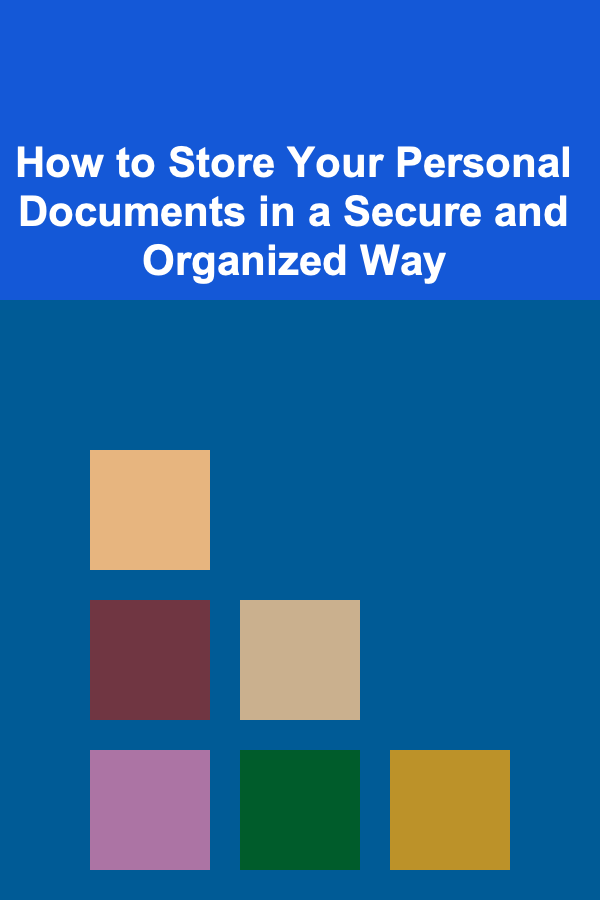
How to Store Your Personal Documents in a Secure and Organized Way
ebook include PDF & Audio bundle (Micro Guide)
$12.99$10.99
Limited Time Offer! Order within the next:

In the modern world, personal documents---whether they are legal, financial, medical, or related to personal identification---carry immense importance. They hold sensitive information, and as such, it is vital to store them securely and in an organized manner. Losing a critical document can lead to significant problems, including identity theft, financial loss, or legal complications. Conversely, having them well-organized ensures easy access when necessary and provides peace of mind knowing that sensitive information is kept safe.
This guide will delve into the best practices for storing your personal documents, focusing on both security and organization. We will explore the types of documents you need to store, various methods of storage (both physical and digital), and the security measures you must take to ensure their protection. Let's get started.
Understanding the Importance of Secure Document Storage
Before diving into storage methods, it's essential to understand why document storage is so crucial. Personal documents can contain sensitive information that, if accessed by unauthorized individuals, could result in severe consequences. For example, a stolen passport or Social Security number could open the door to identity theft. Similarly, losing important legal documents, such as wills or property deeds, may create significant obstacles in legal or personal matters.
Organizing and storing your documents securely not only protects your personal information but also ensures that you can easily retrieve critical documents when needed. It helps reduce clutter and minimizes the chances of misplacing important paperwork.
Types of Personal Documents You Need to Store
Personal documents can be classified into several categories, each requiring specific methods of storage. Understanding these categories helps you decide how to best organize your documents. Here are the most common types of personal documents that need to be stored securely:
1. Legal Documents
These documents include contracts, wills, divorce papers, adoption records, and property deeds. Legal documents are often crucial in protecting your rights and assets, making them a high-priority category for secure storage.
2. Financial Documents
Financial documents, including tax returns, bank statements, investment records, insurance policies, and credit reports, play a vital role in managing your finances. These records can also be helpful when filing taxes, applying for loans, or monitoring your financial status.
3. Identification Documents
This category includes birth certificates, passports, driver's licenses, and Social Security cards. These personal identification documents are essential and should be stored securely to prevent identity theft.
4. Medical Documents
Health records, prescription information, immunization records, and medical bills are all part of this category. Medical documents can help you manage your health and are especially important in emergencies.
5. Personal Documents
This category covers a wide range of personal items, such as family records, educational transcripts, and other sentimental documents. While these documents may not always carry the same legal or financial importance, it's still essential to store them securely to preserve memories and keep them accessible.
6. Business Documents
For entrepreneurs or freelancers, business-related documents such as contracts, tax filings, invoices, and employee records must be stored securely to ensure compliance with regulations and protect against potential disputes.
Methods of Storing Personal Documents Securely
Storing personal documents can be divided into two primary methods: physical storage and digital storage. Each method offers distinct advantages, and a combination of both may be the best approach depending on your needs.
1. Physical Document Storage
a. Fireproof and Waterproof Safe
One of the best ways to store critical physical documents such as passports, wills, and financial records is in a fireproof and waterproof safe. These safes are designed to protect documents from natural disasters, fires, and water damage. They are available in various sizes and price ranges, and many models are lockable to prevent unauthorized access.
- Advantages: Provides maximum protection against disasters, theft, and unauthorized access.
- Disadvantages: Requires space and may be costly for high-quality models.
b. File Cabinets and Folders
A more conventional method for storing documents is in file cabinets . Organizing documents into folders or binders based on categories, such as "taxes," "medical," and "legal," is an effective way to maintain order. Using labeled file folders or color-coded folders adds another layer of organization.
- Advantages: Affordable, easy to organize, and provides easy access.
- Disadvantages: Not very secure unless locked, and doesn't protect against environmental factors like fire or water damage.
c. Lockboxes
For important items that you don't want to keep in a safe or file cabinet, such as a will or original legal documents, a lockbox can be a good option. A lockbox provides a level of security and is small enough to keep in a closet or drawer.
- Advantages: Easy to access, provides basic security.
- Disadvantages: Less secure than a safe and may not protect against fire or water damage.
d. Organized Personal Filing System
If you prefer not to use a safe or lockbox for day-to-day storage, having an organized personal filing system within your home office or a designated space can be helpful. It is critical to categorize your documents clearly and store them in labeled folders.
- Advantages: Makes it easier to access documents and reduces clutter.
- Disadvantages: Does not provide protection against theft, fire, or water damage.
2. Digital Document Storage
a. External Hard Drive or USB Drive
Digital storage has become increasingly popular as people seek to store their documents in a more space-efficient manner. One of the simplest and most affordable methods is using an external hard drive or USB flash drive. These devices offer large storage capacities and can be easily stored in a safe or lockbox for added protection.
- Advantages: Easy to transport, provides backup options for documents, and saves physical space.
- Disadvantages: Can be lost or damaged if not stored securely; requires regular backups.
b. Cloud Storage
Cloud storage has emerged as a powerful method for storing digital documents. Services like Google Drive , Dropbox , OneDrive , and iCloud offer encrypted cloud storage solutions where you can upload documents and access them from virtually any device with an internet connection.
- Advantages: Secure backup, easy access from any device, and remote access.
- Disadvantages: Dependent on an internet connection, potential for hacking if not adequately secured.
c. Encrypted Digital Vaults
For highly sensitive personal documents, consider using an encrypted digital vault. These secure digital storage solutions encrypt your documents with advanced encryption techniques, ensuring that only authorized individuals can access the files.
- Advantages: Maximum digital security and encryption.
- Disadvantages: May require a subscription and technical knowledge to use securely.
d. Digital Scanning and Organization
If you prefer not to store physical copies of certain documents, consider scanning them to create digital files. Scanning apps or devices allow you to convert physical paperwork into digital formats such as PDF files. You can then store these files in an organized, encrypted folder on your computer or cloud service.
- Advantages: Reduces physical storage requirements and offers easy access to documents.
- Disadvantages: Requires an investment in scanning equipment and additional storage solutions.
Best Practices for Organizing and Securing Personal Documents
Organizing and securing your personal documents requires more than just picking a storage method. You also need to follow best practices to ensure that your documents remain accessible, secure, and up to date. Here are some tips to help you get started:
1. Categorize and Label
Categorize your documents based on their type and purpose (e.g., taxes, insurance, medical, legal, etc.). Label folders or digital files clearly to ensure easy identification and retrieval. This also helps avoid confusion and ensures that important documents don't get misplaced.
2. Regularly Backup Digital Files
To safeguard against data loss, it's essential to back up your digital files regularly. This includes not only your personal documents but also any scanned copies or important emails. You can back up your files to a cloud service, external hard drive, or even a USB flash drive.
3. Use Password Protection
For digital storage, always use strong passwords and two-factor authentication (2FA) to secure your cloud storage and files. Avoid using easily guessable passwords, and make sure that your online storage accounts are protected with the highest level of security possible.
4. Periodically Review and Purge Old Documents
It's essential to review your stored documents every few months or once a year to remove anything that's no longer necessary. Old financial statements, outdated medical records, or expired contracts may no longer be needed and should be securely destroyed to prevent clutter.
5. Shred Paper Documents
For physical documents, always shred anything you no longer need. This includes old bills, credit card offers, and any documents that contain personal or sensitive information. Shredding ensures that these documents can't be reconstructed by anyone with malicious intent.
6. Create an Emergency Access Plan
In case something happens to you, make sure that a trusted individual knows how to access your stored documents. This could be a spouse, family member, or attorney. Consider giving them instructions for accessing your physical safe or sharing your digital passwords in a secure manner.
Conclusion
Storing personal documents securely and in an organized way is crucial to protecting your sensitive information and ensuring that you can access your records when necessary. Whether you opt for physical storage in a fireproof safe or a digital storage solution like cloud services and encrypted vaults, there are plenty of options available to suit your needs. By implementing the best practices outlined in this article, you can ensure that your personal documents are both secure and easy to manage.
Reading More From Our Other Websites
- [Home Budget 101] How to Use Budgeting Apps and Tools to Manage Your Home Finances Effectively
- [Personal Investment 101] How to Set Financial Goals and Align Your Investments with Them
- [Personal Finance Management 101] How to Set Realistic Financial Goals Based on Your Income
- [Home Budget Decorating 101] How to Upgrade Your Home's Curb Appeal on a Budget
- [Personal Investment 101] Turn Deep Learning Knowledge into Profits with AI-Powered Products
- [Small Business 101] How to Build a Community‑Driven Loyalty Program for Independent Bookstores
- [Organization Tip 101] How to Teach Kids About Holiday Decoration Traditions
- [Home Party Planning 101] How to Create a Unique Guest List That Fits Your Party Style
- [Scrapbooking Tip 101] Time-Saving Scrapbooking Hacks Every DIY Enthusiast Needs
- [Toy Making Tip 101] From Concept to Creation: Essential Tools for Crafting Handmade Toys

How to Have a Family Board Game Tournament
Read More
How to Navigate Local Laws and Regulations for Rental Properties
Read More
How to Use Lighting to Enhance Your Home's Color Palette
Read More
How To Plan for Philanthropy in Your FIRE Plan
Read More
How to Improve Your Reaction Time in Fast-Paced Games
Read More
Understanding the Latest in Cancer Immunotherapy
Read MoreOther Products

How to Have a Family Board Game Tournament
Read More
How to Navigate Local Laws and Regulations for Rental Properties
Read More
How to Use Lighting to Enhance Your Home's Color Palette
Read More
How To Plan for Philanthropy in Your FIRE Plan
Read More
How to Improve Your Reaction Time in Fast-Paced Games
Read More